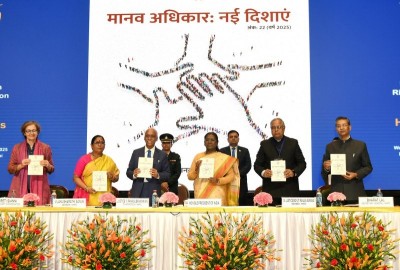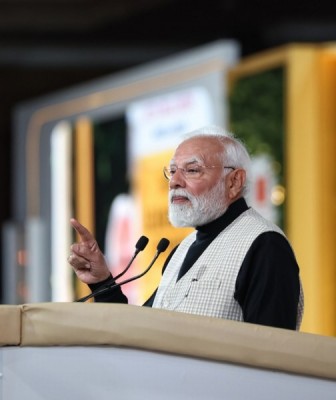 India-USA
India-USA
Unmasking bias: India’s rejection of US human rights report
India strongly rejected the United States State Department report titled "2023 Country Reports on Human Rights Practices: India."
The report alleged India of having significant human rights violations last year. It specifically mentioned an ethnic conflict in the state of Manipur that resulted in violence and displacement.
The U.S. report claimed that around 175 people were killed and more than 60,000 people were left homeless due to the conflict. India rejected the report, calling it "deeply biased" and a sign that the U.S. does not understand the situation in India well.
The report, mandated by Congress and released annually, summarizes the human rights situation in various countries.
The document noted that Prime Minister Narendra Modi himself condemned the violence as "shameful" and called for action. Elsewhere, the report also raised concerns about a 60-hour long search of the BBC's offices in Delhi and Mumbai by Indian authorities. This action, which took place in February 14th, 2023, came shortly after the BBC broadcast a documentary critical of Prime Minister Modi.
The report acknowledged some positive developments. For instance, in July of last year, the government finally permitted a march to take place in Srinagar, allowing members of the Shia community to commemorate Muharram.
This procession marked a significant milestone as it represented the first time the government officially sanctioned the event in Srinagar since a ban was imposed in 1989. It is important to note that the government did impose some limitations on the march, such as restrictions on the use of slogans or the display of logos associated with any banned organizations.
It is useful to emphasize here the perennial US concern for Human Rights records across the world is a deliberate strategy in service of the US aspiration for global hegemony. In his book "Not Enough: Human Rights in an Unequal World" (2018), scholar Samuel Moyn argues that the focus on human rights advocacy hasn't achieved its core goal of eliminating significant economic inequality around the Globe. Moyn suggests that current human rights efforts fall short in addressing this crucial aspect.
Obsessive Human Rights advocates must face a harsh reality. The global order has embraced human rights as a core principle, yet the world seems to be falling apart with multiple crises happening simultaneously. This raises a crucial question: are these two trends simply coincidental, or is there a deeper connection? Growing scepticism and doubt surround its ability to tackle humanity's most pressing challenges. This criticism extends beyond academic circles.
Even within academia, a traditionally strong supporter of human rights, a growing body of research is increasingly critical of the perceived failures of human rights to deliver on its promises. In their current form, human rights are partly to blame for the world's current problems.
Human Rights simply haven't done enough to address the major issue of global and domestic inequality. Human Rights organizations lack ambition and are too willing to follow the lead of global economic and political forces that create these inequalities.
While the official view of the UN, states that all human rights are equally important, in reality human rights organizations have had success only in promoting civil and political rights. These successes come from the idea that everyone should be treated equally and not discriminated against.
The fight for equality continues in countries where discrimination is still legal or where social, cultural, and religious beliefs allow discrimination to happen even if it's against the law.
There is a gap between two types of equality in human rights. Status equality is about everyone having the same legal and political rights, regardless of background.
This is achieved by defending civil and political rights like freedom of speech and the right to vote.
Material equality means everyone having the comparable amount of material resources, like income or property. Historically, the focus has always been on achieving status equality.
The International Covenant on Economic, Social and Cultural Rights was a big step forward in recognizing social rights, which are related to material well-being. However, these social rights only aim for sufficiency, which means ensuring everyone has enough to live on, not true material equality.
The problem with just focusing on sufficiency is that it allows for vast differences in wealth and resources. Someone could be considered "sufficient" if they have just enough to survive, even if others have a lot more. This creates a society with a big gap between rich and poor, which might undermine the idea of everyone having equal status.
Many argue that social rights are being reduced to simply providing people with the bare minimum they need to survive. This approach shows a deep lack of moral ambition. On top of that, it allows vast economic inequalities to grow rapidly around the world. These inequalities contribute to many people dying prematurely.
Even when laws are passed to guarantee social rights, they often fail to make a difference. This is because there's a widespread lack of political will to actually enforce and implement them. But even if these laws were enforced, the standards they set for social rights are simply not good enough. These standards are designed in a way that allows for massive economic inequality to exist alongside them.
Beyond this normative level, the US has either conducted or tolerated rampant violations of human rights even in this limited sense. The United States has long portrayed itself as a global leader in upholding human rights. It frequently criticizes other countries for human rights violations. However, recent reports and events raise questions about the US's own human rights record.
The Human Rights Measurement Initiative (HRMI) recently evaluated the United States' human rights performance, revealing concerning shortcomings.
The report highlights deficiencies in protecting citizens from discrimination and police brutality, notably through voter suppression tactics that disproportionately affect minorities and disabled individuals. Black Americans are particularly vulnerable to these human rights abuses, as emphasized by recent protests against police violence following George Floyd's death. The irony of the US criticizing other nations for similar actions while condoning violence against its own citizens undermines its global human rights credibility.
This hypocrisy is exacerbated by the Trump administration's actions, including praise for leaders accused of minority rights violations, like China's President Xi Jinping, and policies reflecting racial bias, such as refugee resettlement reductions, particularly from non-European countries, and harsh treatment of asylum seekers.
The US has drastically reduced admissions, particularly from non-European countries, reflecting a narrowing of its refugee policies.The UN has condemned these practices as potentially illegal, highlighting the arrest of individuals for expressing their beliefs as a recent example of rights violations.
The US's poor human rights record, especially concerning minorities, hampers its ability to advocate for human rights internationally. Criticisms from the United Nations Human Rights Committee in November 2023 further underscore areas where the US falls short of global standards, including immigration policies, reproductive rights, detainee treatment, and law enforcement practices.
These criticisms range from making asylum-seeking more difficult to concerns about conditions in detention facilities and restrictions on abortion access that disproportionately affect marginalized groups.
The Committee calls for accountability for those perpetrating abuses, an end to racial profiling, and the cessation of excessive force against detainees and peaceful protesters.The US must address these issues to regain its global human rights standing.
While required to respond to the Committee's observations, there isskepticism about the US's commitment, given its failure to implement principles it preaches to other nations.
In conclusion, India has faced baseless allegations aimed at tarnishing its image, while the US leverages such accusations to maintain global dominance.
These tactics underscore a broader agenda of perpetuating hegemony. India stands as a beacon of democratic resilience, navigating complex socio-political milieu with integrity and inclusivity.
Contrary to these narratives, India upholds high democratic standards, prioritizing the well-being of its diverse population.
It ensures the protection of religious and ethnic minorities, addresses inequality through redistributive measures, including reservation for the deprived, marginalized, and less fortunate, and diligently implements democratic principles.
This balanced approach reflects India's commitment to secular values and inclusive governance, evidenced by its comprehensive welfare schemes. India's unwavering dedication to democratic principles serves as a testament to its resilience and integrity on the global stage.
(About the author: Dr Maheep is a leading analyst of Global Politics and international Relations. He contributes articles regularly on the issues of utmost importance to humanity.)
Support Our Journalism
We cannot do without you.. your contribution supports unbiased journalism
IBNS is not driven by any ism- not wokeism, not racism, not skewed secularism, not hyper right-wing or left liberal ideals, nor by any hardline religious beliefs or hyper nationalism. We want to serve you good old objective news, as they are. We do not judge or preach. We let people decide for themselves. We only try to present factual and well-sourced news.







